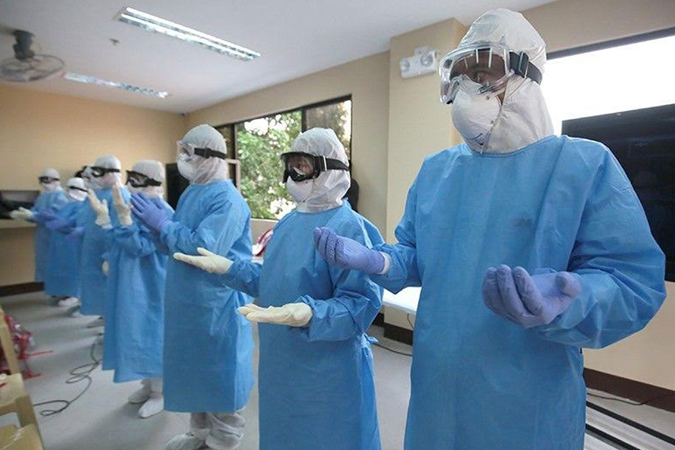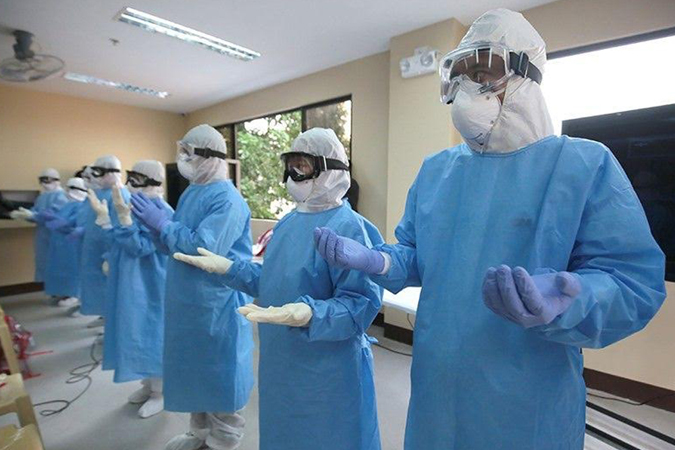
Gov’t may reconsider cap on health workers leaving for abroad
THE PHILIPPINE government may still expand the cap on the number of health workers allowed to leave for overseas jobs, currently set at 5,000 annually, according to a Labor official. “We are just making sure that our capacity in health institutions won’t be affected here while we still need to fight the pandemic,” Philippines Overseas Employment Administration (POEA) Administrator Bernard P. Olalia said in a briefing on Monday. The POEA will soon release the guidelines on health workers qualified for deployment following President Rodrigo R. Duterte’s approval of the recommendation to lift the ban imposed in mid-March. Palace Spokesperson Harry L. Roque, in a separate briefing, said the 5,000 limit will take effect January 1. Mr. Roque said the administration will continue to assess how it can balance the country’s need for healthcare workers with allowing medical personnel to seek opportunities abroad. — Gillian M. Cortez
Fight for justice not over for families of Maguindanao massacre victims
THE DEPARTMENT of Justice recommended the filing of charges against only eight out of the 48 suspects in the 2009 Maguindanao massacre case, the lawyer of the families’ victims said. Lawyer Nena A. Santos said they received the resolution dated August 28, 2019 only last month, where only eight were indicted for multiple murder over the killing of more than 50 people including 32 journalists. “We’re now on the 11th year and we are still here because there are still matters that has to be considered and there are matters that needs to be acted upon because the fight is not yet over,” Ms. Santos said in an online briefing. The complaint against the 40 suspects were dismissed for lack of probable cause as they may have attended some of the supposed meetings but they did not take part in the actual killings, according to prosecutors. Ms. Santos said they have filed a motion for reconsideration over the dismissal of the complaint against the 40. The prosecutors said six of the indicted were among those who attended the meetings and participated in the shooting of the victims. It also said that evidence against seven of them “remains uncontroverted” for failing to participate in the preliminary investigations. A police officer who led his men in blocking the convoy of the victims is among those indicted. The Maguindanao massacre, which took place on Nov. 23, 2009, is considered the worst election-related violence and journalist killing in the country. A Quezon City court in December last year convicted former Maguindanao Mayor Datu Andal “Unsay” Ampatuan, Jr. and his brother Zaldy, who is a former governor of the Autonomous Region in Muslim Mindanao, and 26 other principal accused for 57 counts of murder. More than a dozen were convicted as accessories to the crime while 50 others were acquitted. They were ordered to pay P129.57 million in damages to the heirs of the victims. All of the accused were acquitted of one murder count of reasonable, over the death of photojournalist Reynaldo Momay whose body was not found at the crime scene. Only his denture and jacket were found and his name and signature were on the attendance sheet in the convoy. Ms. Santos said appeals for the first wave of convictions are now with the court of appeals. The Palace, meanwhile, renewed its pledge to help pursue justice for the victims. In a briefing on Monday, Palace Spokesperson Harry L. Roque said law enforcement agencies would not stop efforts to catch suspects who are still at large. — Vann Marlo M. Villegas and Gillian M. Cortez
Bill addressing ‘spaghetti wires’ passes committee level
A CONSOLIDATED bill mandating the proper installation and maintenance of overhead wires for power, telecommunication, and cable passed committee level at the House of Representatives on Monday. The committees on information and communications technology and on energy approved a still unnumbered bill which consolidated House bill numbers 515, 646, and 4222. The measure seeks to prevent the installation of cable wires and electrical posts in a particular area without the proper inspection and approval of a city or municipal engineer. “The specific location shall be inspected by the engineering officials prior to, during and after the installation,” the bill stated. Entangled lines, referred to as spaghetti wires, for various utilities are common across the country, especially in urban areas. The measure proposes to create an inter-agency committee composed of representatives from related government agencies and the local engineer “to set and implement the standard height, volume and capacity of electric and cable wires, and posts in every location and distance.” The bill also mandates public utility companies to submit a plan and design for the installation of cable wires and electrical posts in a particular location, which will be subject to the city or municipal engineer’s approval. Companies will also be required to conduct quarterly monitoring and maintenance of their wires and facilities. — Kyle Aristophere T. Atienza
House committee OKs bill for stricter issuance of PWD IDs
THE HOUSE of Representatives committee on persons with disabilities (PWDs) on Monday approved in principle a bill mandating the stricter issuance of identification cards for disabled persons. House bill No. 7277 seeks to enforce a rigorous enforcement and stricter requirements on the issuance of PWD IDs by amending Republic Act 7277 or the Magna Carta for Disabled Persons. “Among the recommendations of different agencies on the proposed measure, including the issuance of one type of PWD Identification Card instead of categorizing it into apparent and non-apparent disability as recommended by the Department of Health,” Negros Occidental 5th District Rep. Ma. Lourdes T. Arroyo, the committee’s chairperson said in a statement on Monday. Ms. Arroyo said there is an urgent need to upgrade and standardize the system in the issuance of PWD IDs in light of reports of abuse. “The lack of a standard and efficient system in acquiring PWD IDs enables those individuals who do not have a disability to take advantage of the benefits of the laws that are supposed to be granted only to legitimate persons with disabilities,” she said. — Kyle Aristophere T. Atienza
